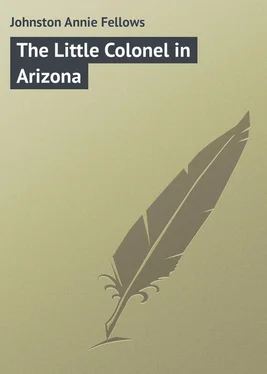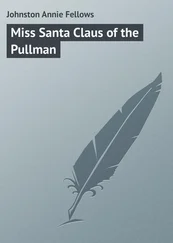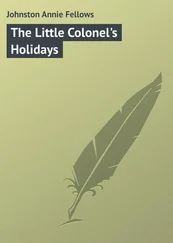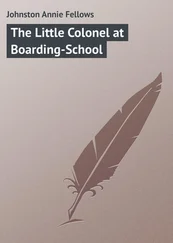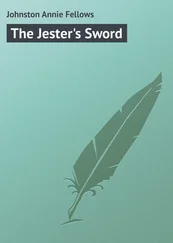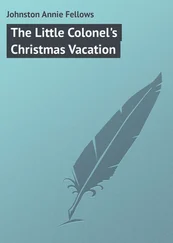Annie Johnston - The Little Colonel in Arizona
Здесь есть возможность читать онлайн «Annie Johnston - The Little Colonel in Arizona» — ознакомительный отрывок электронной книги совершенно бесплатно, а после прочтения отрывка купить полную версию. В некоторых случаях можно слушать аудио, скачать через торрент в формате fb2 и присутствует краткое содержание. Жанр: foreign_prose, foreign_adventure, на английском языке. Описание произведения, (предисловие) а так же отзывы посетителей доступны на портале библиотеки ЛибКат.
- Название:The Little Colonel in Arizona
- Автор:
- Жанр:
- Год:неизвестен
- ISBN:нет данных
- Рейтинг книги:3 / 5. Голосов: 1
-
Избранное:Добавить в избранное
- Отзывы:
-
Ваша оценка:
- 60
- 1
- 2
- 3
- 4
- 5
The Little Colonel in Arizona: краткое содержание, описание и аннотация
Предлагаем к чтению аннотацию, описание, краткое содержание или предисловие (зависит от того, что написал сам автор книги «The Little Colonel in Arizona»). Если вы не нашли необходимую информацию о книге — напишите в комментариях, мы постараемся отыскать её.
The Little Colonel in Arizona — читать онлайн ознакомительный отрывок
Ниже представлен текст книги, разбитый по страницам. Система сохранения места последней прочитанной страницы, позволяет с удобством читать онлайн бесплатно книгу «The Little Colonel in Arizona», без необходимости каждый раз заново искать на чём Вы остановились. Поставьте закладку, и сможете в любой момент перейти на страницу, на которой закончили чтение.
Интервал:
Закладка:
During the three weeks that the Wares had been on the ranch they had made many friends among the boarders. Most of them could do little but sit in the sun and wait for the winter to creep by, so they welcomed anything that relieved the monotony of the long idle days. Mary's unexpected remarks gave fresh zest to the conversation. The boys, bubbling over with energy and high spirits, were a constant source of entertainment, and Joyce's enthusiasms were contagious. She was constantly coming in from the desert with some strange discovery to arouse the interest of the listless little company.
Now, as her challenge passed around the table, any one hearing her laugh at the amusing replies would not have dreamed that only a few hours before she was sobbing to Jack that she was sick of seeing nothing but invalids and sand and cactus.
"We haven't any name for our new home," she announced, "and I'm thinking of having a name contest. Any one can offer an unlimited number, and the best shall receive a prize."
"Then I'll win," responded the Scotchman, promptly. "There's nae mair appropriate name for a wee bit lodging-place like that, than Bide-a-wee ."
"That is pretty," said Joyce, repeating it thoughtfully. "I love the old song by that name, but I'm afraid that it isn't exactly appropriate. You see, we may have to bide there for years and years instead of just a wee."
"Give it a Spanish name," said the minister. "Alamo means cottonwood, and you have a group of cottonwoods there. That would be just as good as naming it The Pines, or The Oaks, or The Beeches."
"No, call it something Indian," said the cowboy. "Something that means little-mud-house-in-the-desert, yet has a high-sounding swing to the syllables."
"Wait till we get through fixing it," interrupted Jack. "It'll look so fine that you won't dare call it little-mud-house-in-the-desert. We're going to paint and paper it ourselves."
"Not you two children," exclaimed the Norwegian, in surprise.
"With our own lily fingers," answered Joyce.
"Then you'll have an interested audience," he answered. "You'll find all of us who are able to walk perching in the fig-trees outside your door every morning, waiting for the performance to begin."
"Whoever perches there will have to descend and help, won't they, Jack?" said Joyce, saucily.
"Oh, mamma," whispered Mary, "is Mr. Ellestad really going to climb up in the fig-tree and watch them? Please let me stay home from school and help. I know I can't study if I go, for I'll be thinking of all the fun I'm missing."
CHAPTER III.
A DAY AT SCHOOL
It was with a most unwilling mind and an unhappy heart that Mary began her third week at school. In the first place she could not bear to tear herself away from all that was going on at the new house. She wanted to have a hand in the dear delights of home-making. She wanted to poke the camp-fire, and dabble in the paste, and watch the walls grow fresh and clean as the paper spread over the old patches. The smell of the fresh paint drew her, and gave her a feeling that there were all sorts of delightful possibilities in this region, yet unexplored.
In the second place, life in the new school was a grievous burden, because the boys, seeing how easily she was teased, found their chief pleasure in annoying her. She was a trusting little soul, ready to nibble the bait that any trap offered.
"Never mind! You'll get used to it after awhile," her mother said, consolingly, each evening when she came home with a list of fresh woes. "You're tired now from that long walk home. Things will seem better after supper." And Joyce would add, "Don't look so doleful, Mother Bunch; just remember the vicar, and keep inflexible. Fortune is bound to change in your favour after awhile." But the third Friday found her as unhappy as the third Monday.
There were two rooms in the school building, one containing all the primary classes, the other the grammar grades, where Holland found a place. Mary had one of the back seats in the primary department, and one of the highest hooks in the cloak-room, on which to hang her belongings. But this Friday morning she did not leave her lunch-basket in either place.
She and Patty Ritter, the little girl who sat across the aisle from her, had had an indignation-meeting the day before, and agreed to hide their baskets in a hedgerow, so that there could be no possibility of Wig Smith's finding them. Salt on one's jelly cake and pepper in one's apple-pie two days in succession is a little too much to be borne calmly. Wig Smith's fondness for seasoning other people's lunches was only one of his many obnoxious traits.
"There," said Mary, scanning the horizon anxiously, to see that no prowling boy was in sight. "Nobody would think of looking behind that prickly cactus for a lunch-basket! We're sure of not going hungry to-day!"
With their arms around each other, they strolled back to the schoolhouse, taking a roundabout way, with great cunning, to throw Wig Smith off the track, in case he should be watching. But their precautions were needless this time. Wig had set up a dentist's establishment on the steps of the stile, his stock in trade being a pocket-knife and a hat full of raw turnips. Nothing could have been friendlier than the way he greeted Mary and Patty, insisting that they each needed a set of false teeth. Half a dozen of his friends had already been fitted out, and stood around, grinning, in order to show the big white turnip teeth he had fitted over the set provided by Nature. As the teeth were cut in irregular shapes, wide square-tipped ones alternating with long pointed fangs, and the upper lip had to be drawn tightly to hold them in place, the effect was so comical that they could hardly hold the new sets in position for laughing at each other.
In payment for his work, Wig accepted almost anything that his customers had to offer: marbles, when he could get them, pencils, apples, fish-hooks, even a roll of tin-foil, saved from many chewing-gum packages, which was all one girl had to trade.
A search through Mary's orderly pencil-box failed to show anything that he wanted of hers, but the neatly prepared home lesson which fluttered out of her arithmetic caught his eye. He agreed to make her the teeth for a copy of six problems which he could not solve. Mary had much the hardest part of the bargain, for, sitting on the stile, she patiently copied long-division sums until the second bell rang, while he turned off the teeth with a few masterful strokes of his knife.
"Let's all put them in as soon as we're done singing, and wear them till we recite spelling," he suggested. "It's mighty hard to keep from chawin' on 'em after they've been in your mouth awhile. Let's see who can keep them in longest. Every five minutes by the clock, if the teacher isn't lookin', we'll all grin at onct to show that they're still in."
Needless to say, the usual Friday morning studiousness did not prevail in the primary room that morning. Too many eyes were watching the clock for the moment of display to arrive, and when it did arrive, the coughing and choking that was set up to hide the titters, plainly told the teacher that some mischief was afoot. If she could have turned in time to see the distorted faces, she must have laughed too, it was such a comical sight, but she was trying to explain to a row of stupid little mathematicians the mysteries of borrowing in subtraction, and always looked up a moment too late.
Mary Ware, having written every word of her spelling lesson from memory, and compared it with her book to be sure that she knew it, now had a quarter of an hour of leisure. This she devoted to putting her desk in order. The books were dusted and piled in neat rows. Everything in her pencil-box was examined, and laid back with care, the slate-rag folded and tucked under the moist sponge. There was another box in her desk. It had bunches of violets on it and strips of lace-paper lining the sides. It smelled faintly of the violet soap it had once held. She kept several conveniences in this, pins, and an extra hair-ribbon in case of loss, a comb, and a little round mirror with a celluloid back, on which was printed the advertisement of a Plainsville druggist.
Читать дальшеИнтервал:
Закладка:
Похожие книги на «The Little Colonel in Arizona»
Представляем Вашему вниманию похожие книги на «The Little Colonel in Arizona» списком для выбора. Мы отобрали схожую по названию и смыслу литературу в надежде предоставить читателям больше вариантов отыскать новые, интересные, ещё непрочитанные произведения.
Обсуждение, отзывы о книге «The Little Colonel in Arizona» и просто собственные мнения читателей. Оставьте ваши комментарии, напишите, что Вы думаете о произведении, его смысле или главных героях. Укажите что конкретно понравилось, а что нет, и почему Вы так считаете.
